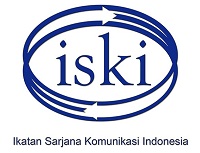Praktik Jurnalisme Kloning di Kalangan Wartawan Online
Abstract
The practice of cloning journalism is one of the most interesting phenomenon in the world of journalism. This practice has been considered as a common thing among journalists, especially online journalists. Whereas the practice of cloning journalism is closely related to plagiarism which is clearly incompatible with the ethics of journalism. Through this research the writer will discuss about the reasons behind this practice and what ethics have been violated by journalists who did it. The writer also discuss what ethics have been violated by journalists who do cloning journalism and why is this practice rife among online journalists using an autoetnography research method. The result of this research shows that the practice of cloning journalism among journalists is done because of several factors that include cooperation and solidarity among fellow journalists, the demand of online journalists’ work to write as many news as possible in the shortest period of time, the performance of journalists as an individual, regulation of mass media company, and the development of technology. The practice of cloning journalism is proven to be incompatible with the ethics of journalism because it is a form of plagiarism in the realm of mass media. It is also incompatible with regulations about accuracy and verification.
Keywords
Full Text:
PDFReferences
Agee, W.K., Philip H. A., and Edwin E. (1994). Introduction M a s s Communication Elevent E d i t i o n . New York: Harper Collins College Publisher.
Chaang-Keon, Ryu., Hyong-Jun, Kim., & Hwan-Gue, Cho. (2009). A Detecting and Tracing Algorithm for Unauthorized Internet-news Plagiarism Using Spatio-temporal Document Evolution Model, Artikel pada ACM symposium on Applied Computing (SAC ’09), New York: ACM.
Chang, H. (2008). Autoethnography as a
Method, California: Left Coast Press, Inc
Kartinawati, E. (2017). Jurnalisme Kloning di Kalangan Wartawan Kota Surakarta.
Jurnal The Messenger, Volume 9 (1).
Kode Etik Aliansi Jurnalis Independen (AJI) diunduh dari situs https://aji.or.id/.
Kode Etik Jurnalistik (KEJ) Dewan Pers diunduh dari situs https://dewanpers. or.id/.
Lestari, R. D. (2015). J u r n a l i s m e Kloning, Praktik Plagiarisme Karya Jurnalistik di Kalangan Jurnalis (Studi Kasus Praktik Jurnalisme Kloning di Kalangan Jurnalis di DIY), Tesis, Yogyakarta: Universitas Gadjah Mada.
Lynch, M. (1993). Scientific Practice and Ordinary Action: Ethnomethodology and Social Studies of Science. Cambridge UP.
Samson, A. M. (2009). Plagiarism and Fabrication Dishonesty in The Newsroom. Wellington New Zealand: Massey University.
Paramita, E. (2013). Pemahaman Wartawan Terhadap Etika Profesi (Studi Deskriptif Kualittaif pada Wartawan Koran Lokal Kota Denpasar – Bali). Jurnal Ilmu Komunikasi Fakultas Ilmu Sosial dan Ilmu Politik, Malang: Universitas Brawijaya.
Pedoman Pemberitaan Media Siber (PPMS) diunduh dari situs https://dewanpers. or.id/.
Soelistyo, H. (2011). Plagiarisme Pelanggaran Hak Cipta dan Etika. Yogyakarta: Kanisius.
Syah, S. (2011). R a m b u - R a m b u Jurnalistik. Yogyakarta: P u s t a k a Pelajar.
Ward, M. (2002). Journalism Online. Oxford: Focal Press.
DOI: https://doi.org/10.29313/mediator.v11i1.2736
Refbacks
- There are currently no refbacks.

This work is licensed under a Creative Commons Attribution 4.0 International License























